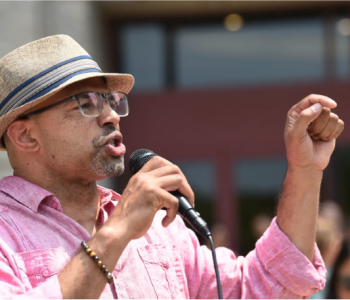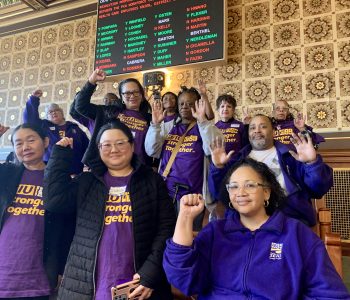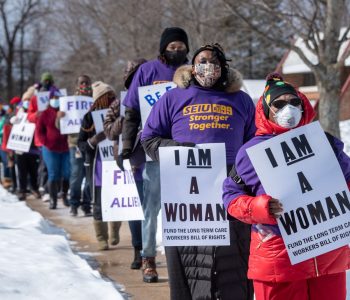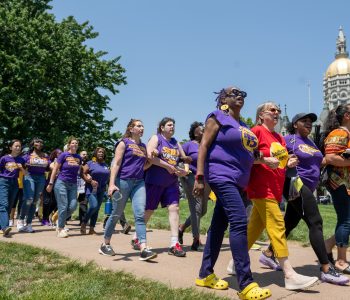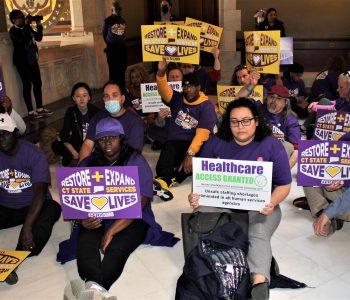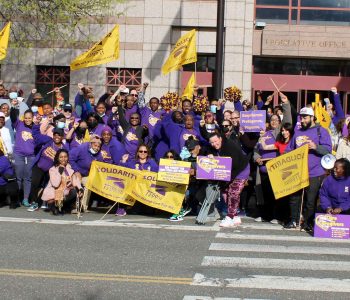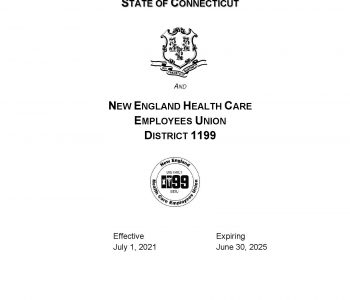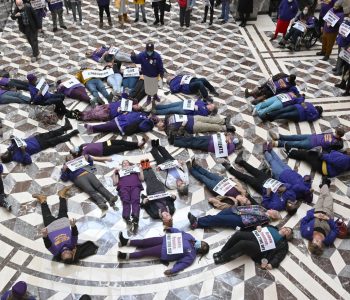The union, which represents 25,000 government and private-sector health care workers in hospitals, nursing homes, group homes and home care settings, raised a host of concerns at a press conference Thursday afternoon. They ranged from insufficient availability of masks and other supplies to issues related to health care workers who are unable to go to work because their child’s school is closed.
“We’re here because we’re hearing across all of the sectors where we have members concerns about the preparedness for COVID-19, concerns about personal health, public health and implications for our members as workers themselves,” said Rob Baril, president of the New England Health Care Employees Union 1199.
Baril noted the spread of the virus in nursing homes in Washington state, where dozens have fallen ill.
Watch the Livestream from Facebook here:
Below are various media articles covering COVID-19:
With coronavirus spreading in Connecticut, when is it appropriate to close schools?
Chelsea Daniels doesn’t get an excused absence from her job as a nurse at Fresh River Healthcare nursing home in East Windsor if her daughter’s school closes.
Health care workers only get a certain amount of sick time and, when it runs out, they are expected to be at work. If schools close, many health care workers will have to scramble to find care for their children, or miss work and face discipline.
“It will definitely have a domino effect if schools close,” said Daniels. “It’s going to result in us working short staffed and people calling out.”
In Daniels’ case, her husband can scale back his work hours to be home with their 11-year-old daughter. But that means a loss of income for her family, which relies on his hourly income. He works at St. Francis Hospital in Hartford and helps with facilities maintenance. Nationwide, about 60% of the workforce are hourly employees.
“It would be challenging,” she said of the loss of income.
Staffing shortages at hospitals, particularly, could also have disastrous consequences for the public during a national health crisis, officials said.
Healthcare officials asking for extra care, attention for elderly who are more at risk to contract coronavirus
“My biggest concern is having to choose between going to work and staying home with my kids, and coming into contact with somebody who has been infected with the COVID-19,” said healthcare worker Chelsea Daniels.
The workers know this is a two-way street, they can expose their clients, and their clients can expose them to COVID-19.
They are trying to figure out what is best for everyone before a positive test comes back and everyone is quarantined.
“If I have been exposed then I can’t go home for 14 days,” Daniels said. “I have little children I have a 1-year-old, a 2-year-old and an 11-year-old, and they need me at home, so I never really want to have to make that decision.”
Health care workers worried
Unionized health care workers and operators of nursing homes are seeking clarity on emergency procedures related to the coronavirus outbreak.
“We’re here because we’re hearing across all of the sectors where we have members concerns about the preparedness for COVID-19, concerns about personal health, public health and implications for our members as workers themselves,” said Rob Baril, president of the New England Health Care Employees Union 1199.
The union, which represents 25,000 government and private-sector health care workers in hospitals, nursing homes, group homes and home care settings, raised a host of concerns at a press conference Thursday afternoon. They ranged from insufficient availability of masks and other supplies to issues related to health care workers who are unable to go to work because their child’s school is closed.
Baril noted the spread of the virus in nursing homes in Washington state, where dozens have fallen ill.
“We’re seeing that nursing homes can be very dangerous vectors for transmission of COVID-19,” he said.
Nursing home residents “depend on us 24 hours a day, 7 days a week,” said Chelsea Daniels, a nurse and mother of three who works at Fresh River Health Care in East Windsor. “We don’t close [but] we have children who need care as well.”
Baril said the union is seeking guidance from the governor and executive-level agencies such as the Department of Social Services and the Department of Developmental Services about how to handle issues related to coronavirus. Given the risks associated with the virus, Baril asked officials to establish protocols such as screening people coming in and going out of healthcare facilities, which has already begun in some places.
The state has placed strict limits on visitors seeking entry to a skilled nursing facility. In most cases, visitors are barred, but exceptions are made for visitors to patients who are in hospice care or at the end of life.
Healthcare Union Calls for More Protections
HARTFORD, CT — The union representing 25,000 nursing home workers and home healthcare aides thinks more can be done to protect its workers and patients.
Rob Baril, president of SEIU 1199, said nursing homes have limited visitors, but everyone who walks through the door should be getting their temperature taken.
“We know there are no easy solutions for COVID-19 preparedness, but we want to raise a high bar,” Baril said.
Gov. Ned Lamont issued a new executive order Thursday that modifies visitor restrictions to all nursing and convalescent homes in the state. The order clarifies that the Commissioner of Public Health may issue restrictions on the number, category and frequency of outside visitors and screening and protective measures “necessary to assure the health and welfare of patients in a nursing home facility, residential care home or chronic disease hospital.”
Baril said the state should establish protocols to monitor people’s temperature when folks are coming in and out of public places, such as state healthcare facilities or large places of employment.
David Skoczulek, vice president of business development for iCare Health Network which manages 11 nursing homes in the Hartford area, said they have already begun taking the temperature of everyone who walks through their doors, including employees.
Skoczulek said that includes vendors, contractors, residents and staff. Anyone entering the nursing home will be asked the CDC screening questions.
He said any new patients are being screened using the CDC guidelines.
Matthew Barrett, president and CT Association of Health Care Facilities, said it’s understandable that workers have concerns.
“Connecticut nursing homes were working overtime in an unprecedented effort to prevent the spread of COVID-19, but that it was very reasonable for nursing home operators and employees to be concerned about how the virus might tax a workforce that’s already understaffed and an industry that is chronically underfunded.”
Nursing homes have no access to coronavirus test kits, which may become available soon to four hospitals in the state. The test kits the state has at the moment are reserved for patients who have been hospitalized.
The state lab has tested 95 individuals: six have tested positive while 89 have tested negative.
Chelsea Daniels, a nurse at Fresh River in East Windsor, said there are fewer people entering the building these days and everyone is getting their temperature taken, including staff.
“We have no way of knowing whether someone has been exposed to COVID-19 or not,” Daniels said. “This virus can take many days to show symptoms and we are in constant contact with many people.”
She said visitors have been limited, but they are still accepting new patients to their facility.
“Nursing homes are receiving some communication from the Department of Social Services,” Baril said. However, he said there has been no communication to the 10,000 home healthcare workers who deliver services to the elderly and disabled population in their own home.
“We’re working together with nursing home operators to make sure nursing home services are preserved,” Baril said.
Daniels said she worries about what happens if schools close. She said she has three children and will have to make a choice between caring for them and caring for the residents where she works.
“The residents depend on us 24 hours a day, seven days a week. We don’t close,” Daniels said. “We have children who need care as well.”
Barrett didn’t disagree.
If “school systems around the state will continue to close, then Connecticut nursing homes will be in a crisis to staff their facilities when workers are home caring for children in addition to sick workers being unavailable to care for Connecticut’s 23,000 nursing home residents. It’s a critical issue that is of immediate concern.”
Baril said they also don’t want employers disciplining their employees if they have to stay at home with their young children because schools are closed.
He said he’s hoping the state will take nursing home and home healthcare workers into consideration when they are developing their plans.
He said if workers exhaust their paid leave they are going to have to make tough choices in terms of being able to provide for themselves and their families.
“Many nursing home workers, home care workers, group home workers have multiple jobs,” Baril said.
https://ctmirror.org/2020/03/13/connecticut-nursing-home-workers-on-coronavirus-we-need-a-better-plan-in-place/
Connecticut nursing home workers on coronavirus: ‘We need a better plan in place’
Adalis Martinez isn’t eating out as much these days. She also doesn’t spend too much time in stores. And she’s washing her hands — a lot.
“When I go to the store and come out, I’m washing my hands even in my car, so that I don’t touch anything,” she said. “It’s very concerning.”
Martinez has been taking precautions ever since learning of the global outbreak of the coronavirus that causes COVID-19 illness. The outbreak was recently declared a worldwide pandemic, and the virus is now spreading in the United States.
But Martinez isn’t just worried about her own health. She fears how this will impact the patients and residents she cares for as a certified nursing assistant at Avery Heights, a skilled nursing facility in Hartford.
“I’m trying to keep safe so that when I got to work, I don’t bring anything back to work, because my concern is the patients,” she said. “They’re older than me, so I need to keep them safe.”
Older adults and seniors are more at risk of suffering serious illness, hospitalization and deadly complications from coronavirus. It has put pressure on Connecticut nursing homes, which have historically been understaffed and underfunded, and their abilities to prevent infection within their walls.
“We’ve seen that in places like Washington State where at the Life Care Center in Kirkland, nursing homes can be just very dangerous vectors for transmission of COVID-19,” said Rob Baril, president of workers union SEIU 1199.
More than 20 deaths have been linked to the Life Care Center, prompting federal investigators to look into inspection reports and infection-control measures.
In Connecticut, 145 out of the state’s 217 nursing homes were cited for infection-control violations between 2017 and 2019, according to an analysis by the Connecticut Health I-Team of data from the U.S. Centers for Medicare and Medicaid Services.
A Kaiser Health News report found that nationally, violations were more common at facilities with fewer nurses and aides. They included incidents of employees failing to wash their hands between patient care, and not putting on gloves, masks or gowns when seeing contagious patients in isolation.
Baril said shortages of protective supplies at Connecticut facilities during a coronavirus outbreak would put both patients and workers in jeopardy.
It’s a problem that Martinez has already brought up to her superiors.
“Yesterday I said, ‘what if we ran out of gloves?’ You know, we need the masks, but we need gloves, too,” she said. “And they were like, ‘well, we’re going to somehow get some.’”
Union officials, nursing home operators and workers were unable to put a number on the current supplies of protective gear at facilities as of Thursday.
But David Skoczulek, spokesman for the iCare Health Network of 11 homes in the Greater Harford area, said they are being cautious about how supplies are being used, preparing for an increased demand going forward as the virus infects more people.
“From our perspective, we’re trying to sort of ration it in an appropriate way,” Skoczulek said. “We’re also trying to put orders into our vendors to say, ‘hey, this is a priority for us.’ This is a priority for everybody in the country, but we don’t want to not make that request.”
